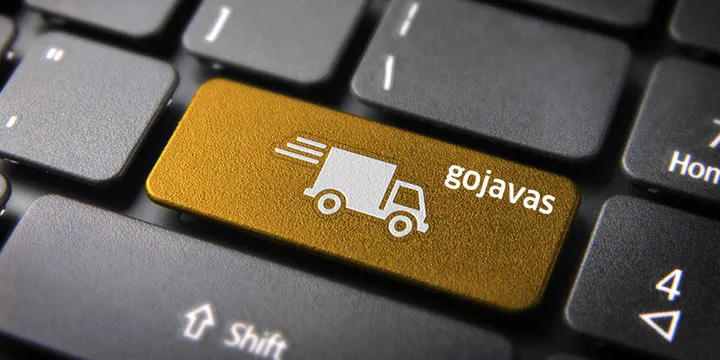From operating out of a van to becoming a Rs 208-crore entity: the story of e-commerce-focused logistics startup gojavas
With e-commerece seeing an unprecedented growth in India, ancillary industries like logistics also have come a long way. To handle e-commerce shipments, a slew of startups like Delhivery, Ecom Express and gojavas emerged during the 2011-13 period. Unlike pure-play e-commerce ventures which witnessed massive consolidation and blood bath, aforementioned logistics companies are going great guns.

Started in 2013 with a 20-people team, gojavas has carved its own niche in the e-commerce-focused logistics space. Currently, the company ships close to 4.5 million e-commerce shipments in a month and claims to have 10 per cent growth in volume on a monthly basis.
Speaking of the early days, Vijay, cofounder and showstopper gojavas, says “We started at Gurgaon without an office space and operated out of a van, with a folding table and chair. We operated with limited infrastructure for a couple of months.” Within two years, the company scaled up to significant heights and it posted a Rs 208-crore turnover last fiscal. Vijay adds,
“We turned EBITDA-positive last year and we’re making profits since last quarter of the previous year.”
The backstory
After graduating from London Business School, Vijay was looking for opportunities in India and got a chance to work with the Rocket Internet-backed fashion portal Jabong. “I spent over 20 months at Jabong and then started gojavas,” he says. Vijay is alumnus of Symbiosis, Pune and had stints at pharma major Ranbaxy in South Africa.
Pointing out the reasons which led him to take a turn from his professional career in pharma, Vijay explains, “During our team meetings, we used to discuss only pharma related things. I didn’t want to end up knowing only pharma. I also wanted to study further, so these two reasons drove me to put in my papers at Ranbaxy.”
Initial hiccups
Getting the right people and technology were the initial barriers for gojavas. However, Vijay found himself lucky to get on board good talent right at the beginning. The company stresses on inculcating long-term culture and imparts it through training. “Our HR training team is three times bigger than our sales team and this validates our strong focus on inculcating standard industry practices and sows the right culture in the company,” says Vijay.
Almost 99 per cent of gojavas’ clientele comes via word of mouth
The Snapdeal backed venture has not taken any marketing effort as of now and most of its clients are bagged through word-of-mouth phenomenon. “We divert our marketing budget towards training, technological development and enhance customer relation and engagement,” Vijay adds.
E-commerce is here to stay
Many people express skepticism over the future of e-commerce, which is largely mired by high valuation and burn-rate. Since the start of its operations, gojavas has been fulfilling logistics needs of many e-commerce startups and Vijay sees exponential growth of product-focused e-commerce majors and startups. He notes,
“We see e-commerce companies growing consistently, from anywhere between 5 and 20 per cent over the past couple of years.”

However, Vijay also believes that some course correction will happen in the Indian e-commerce market and he cautions entrepreneurs to get ready for it. He says,
“Gojavas evaluates risk matrices periodically and aligns its strategies for insulation from market risk. I advise the same for all budding e-commerce entrepreneurs.”
COD still accounts for 60-65 per cent of overall e-commerce orders
Over 60 per cent shipments delivered by gojavas is on Cash on Delivery (COD) basis and Vijay strongly believes this will continue to be major driver of e-commerce phenomenon in India. “Digital wallets may bring down the COD factor, but it will take couple of years to penetrate Tier II and III cities, which are steering the e-commerce growth in India”.
Return rate is still a major headache for e-commerce
Minimising return rate has been a big concern for all e-commerce majors for a long time and it still continues to haunt the overall e-commerce market in India. “Flash sales, and sale of women apparels and shoes see maximum return rate,” adds Vijay. Flash sales of electronics and women’s fashion see anywhere between 15 and 25 per cent return rate, while standard categories like regular electronics see less return rate (in single digit).
Gojavas is set to cater hyperlocal deliveries
This year hyperlocal delivery startups are making a lot of news and they raised over USD 120 million risk capital. Gojavas has also ramped up processes and infrastructure for ensuring hyperlocal deliveries. “If hyperlocal startups are ready to work with us, we will help them get quick scale,” says Vijay. The company is in advance talks with some hyperlocal startups to handle their logistics needs.
At present, local commerce only contributes five per cent to overall logistics in India.
When asked about the frenzy in the space, Vijay says, “I can’t predict how the hyperlocal delivery space will shape up in the future but unit economics look very difficult. We are still figuring out how to make money in enabling our logistics for local commerce.”
Road ahead
With rising trend of online shopping, gojavas is aiming to post over Rs 550-crore turnover this year. “We did over Rs 200 crore last year and set to hit over 550 crore mark this year,” adds Vijay. The Snapdeal-funded company is also betting big on the ‘90 minutes reverse pickup’ feature, across 70 cities in India. “This feature is currently live with five clients and we are looking for e-commerce companies eyeing delivery at short notice,” he adds.
YourStory’s take
With increasing adoption of e-commerce, demand of e-commerce-focused logistics has also escalated. And players like gojavas, Ecom Express, Delhivery and DotZot, among others, are making the supply chain smooth for e-commerce players. However, there is still huge scope for startups that can bring efficient solutions to meet the massive scale of e-commerce.
Besides regular e-commerce shipments (apparels, electronics and accessories), home furnishing, which is one of the fastest growing e-commerce verticals now, requires altogether different skillset and infrastructure. Currently, the home-furnishing space pegs at USD 20 billion and is growing by 15 per cent on a yearly basis.
YourStory along with stakeholders of logistics space believe home furnishing (heavy furniture and accessories) will be big by 2017 and needs to be evangelised and explored by new startups. With the rise of hyperlocal logistics, which is only about five per cent of the overall logistics market, it would be interesting to see how e-commerce-centric logistics players craft their strategies.
Feature image credit: Shutterstock







